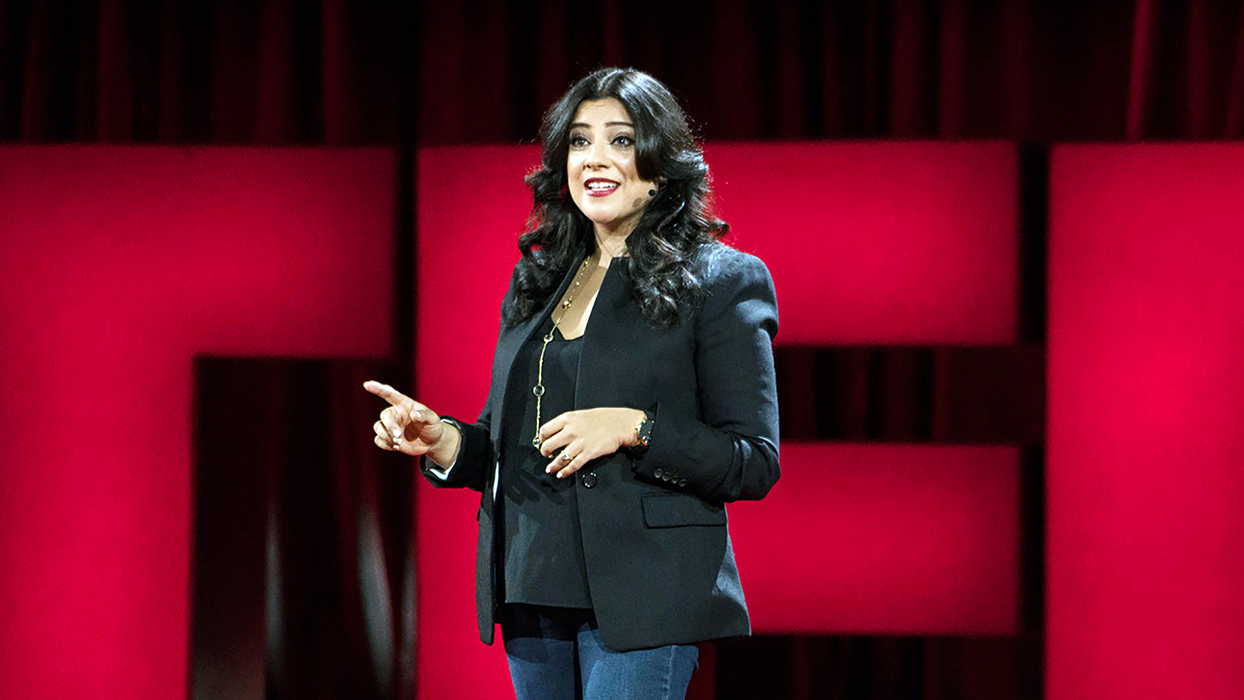Three years ago, Girls Who Code Founder Reshma Saujani gave a TED Talk called Brave, Not Perfect, which struck a nerve among millions of women and girls. A book, a podcast, and a movement later, Reshma is changing how we see ourselves.
On paper, the formula sounds simple. Encourage girls to ditch the exhausting and fruitless quest for perfection and instead practice bravery. No more apologizing every time a pin drops. No more twisting ourselves into a pretzel to get everyone to like us. Instead, cracking the code to a more equitable world between the genders requires a healthy dose of acts of courage both pint-size and monumental. But bringing that strategy to life is a daily struggle, even for Reshma Saujani, who started the Brave, Not Perfect movement.
For example, Saujani loves to sing, but she’s pretty tone deaf. That doesn’t stop her from being the first in line at karaoke. She is not a great surfer. In fact, she can’t really swim, and she’s slightly terrified of water, especially cold water. But there she is, on Long Island or on vacations to Turks and Caicos or Guatemala, talking to herself as she heads for the water. “I’m saying, Get out of your head, Reshma. The whole way there, I’m not happy. But afterwards, I’m euphoric. Even if I don’t get on the board, I want to do it again because for that hour in the ocean I’m completely present.”
Saujani also knows what it feels like to summon your courage, paddle into uncertain water, stand up on the board, and completely wipe out. In 2010, Saujani hit pause on her successful career in law and finance to run for long-time incumbent Rep. Carolyn Maloney’s seat in Congress. In her 2016 TED Talk, Teach Girls Bravery, Not Perfection, Saujani says: “My pollsters told me I was crazy to run, that there was no way that I could win. But I ran anyway… I swore I was gonna win. I had the endorsement of the NY Daily News ... I raised money from everyone I knew, including my Indian aunties. But on election day, the polls were right. I only got 19 percent of the vote. The same papers that said I was a rising political star now said I wasted $1.3 million on 6,321 votes. It was totally humiliating.”
For Saujani, not only was it a resounding and public loss, it was also her first significant failure. In fact, Saujani knows more than most about the crusade for perfection. She grew up in Chicago, the youngest daughter of Ugandan-born parents who were expelled from their native country by President Idi Amin in the 1970s under the threat of death. As refugees, Saujani’s youth was colored by fear and “that idea that at any moment, your life could change, that you could literally be woken up with someone saying, ‘Get out of the country,’ even if you were born there,” Saujani says. “I grew up feeling like you don’t want to draw attention to yourself. The message was to just do really well and contribute.”
Saujani, the 44-year-old author of three books, describes growing up in a family where being the perfect Indian daughter also meant matriculating to an Ivy League college like Harvard or Yale (or both, in Saujani’s case) and becoming a doctor, lawyer, or engineer. Last February, she wrote for CNBC: “Somewhere along the way, being ‘perfect’ turned into being inauthentic, into ignoring my lifelong dream of running for office because I was afraid of losing and letting people down. Before I knew it, I’d
lost my bravery muscle.”
But after building it back up and summoning the guts to run for Congress and losing in the most public way, something happened that flipped the script for Saujani. While it was hugely humbling and disappointing, she survived the failure. “I think for so long I didn’t do the things that scared me the most, because I didn’t want to be broken on the floor and never recover again. When I lost the race, I realized, This sucks. I’m depressed, I’m sad, I’m embarrassed, but I’m not broken,” Saujani says. “At that moment, I started learning this hack that I do now, which is that I gave myself a month to think about it, to cry about it, to drink a lot of margaritas, and then I moved on, and I didn’t wallow in my own self-pity and my own self narrative.”
Saujani’s rebound from the election was decisive. Two years later, she launched Girls Who Code, a business idea that began to percolate when she was on the campaign trail touring New York schools. She observed that computer science classes were almost exclusively filled with boys, and it needled at her. She didn’t know much about tech, but she knew that every day that goes by, another industry is being automated. So, she architected and launched Girls Who Code, which began by teaching 20 girls how to code in its first year. In the 7 years since, the organization has taught 185,000 girls in all 50 states to code as well as 30,000 college-aged alumni who are preparing to enter the workforce. “You look at any computer science department right now and you see the numbers of women growing these departments—those are our students. We are on track to get to gender parity in 2027.”
While Saujani is proud of those numbers and what Girls Who Code has accomplished to date, her influence on women in STEM fields is just one aspect of the equation. The other part is fundamentally changing the messages girls receive from a very young age, encouraging them to stop striving for perfection and focus instead on becoming gritty, determined, resilient women.


My son needs to see me as I am. Every flaw. Every imperfection.

We need men to stand up for women when we’re not in the room. You can’t just do it when you’re forced to. You got to do it because you believe it.
The Perfection Trap
Since basically the beginning of time, girls have long been taught to place a premium on humility over confidence, kindness over assertiveness, and compassion and empathy over ambition. That ultra-focus on manners, propriety, and rule following is often counter to drumming up the kind of internal fortitude required to take risks in education, career, and in life. That part isn’t really in dispute. And while it’s also generally accepted that we’re still a long way from gender parity in salary levels and representation at the top levels of politics and business, Saujani drills down even further by connecting the two concepts. Why aren’t there more women on Fortune 500 boards and in politics? Because they are conditioned to be afraid to fail, Saujani says. In her TED Talk as well as and her book, Brave, Not Perfect, and her podcast of the same name, she challenges centuries of ingrained teaching that says girls should be nice, while boys are encouraged to be bold risk takers.
“A lot of the hesitation and fear has to do with the voice in your head that says you’re not good enough, that you don’t belong there, that you shouldn’t be there—and it’s not crazy,” Saujani says. “We’ve been socialized that way, and we get cues in the workplace that tell us that.”
Over the years, Saujani has seen improvement, but there’s still a significant and pervasive protectiveness around girls that has definitive consequences for individuals and broadly in society. “We’re better at it, but I still see it every single day in very progressive spaces. You hear, ‘Oh, honey, your dress is dirty. Come over here. Let me fix you. Be careful. Don’t get hurt,’” Saujani says. “So, there’s still a lot of coddling and protection for girls and a lot of kind of dreams deferred.”
The absence of women and girls, especially in STEM fields, means technological advances are often made without women in mind. “Here’s an example. One of my students at Girls Who Code reminded me that smarthome devices can be used by perpetrators of domestic violence to lock women up or turn the music up real loud [so neighbors or police can’t hear what’s going on inside],” Saujani says. “That’s scary, and it’s why I operate in this level of frenetic energy and emergency. I feel like every day that goes by, something else is created and engineered that’s going to harm us, and we have to make sure that we get to parity for women and people of color as quickly as we possibly can.
“Gender parity one of the most important issues that we are facing in the workforce.”

Life After Perfect
Even though Saujani doesn’t have a background in technology, she believes Girls Who Code provides the perfect vehicle for girls to practice grit and resilience. There’s something about coding, in particular, that requires guts. To do it well, you have to be all in, to embrace failure. Saujani calls it an “endless process of trial and error.” In her TED Talk, she says: “It often requires many, many tries to get right… until that magical moment when what you’re trying to build comes to life. It requires perseverance. It requires imperfection.”
In many cases, the code process and the Girls Who Code experience has led to problem solving on a much broader scale. She recalls one example of a 16-year-old student named Cora whose father had cancer, and she used her new-found skills to find solutions. “She built an algorithm in our program to help detect whether a cancer is benign or malignant,” Saujani recalls. I also think about one of my students, Nastasia Efremkina, who has grown up in a world where there’s a school shooting or a kid that’s being killed by gun violence in Chicago every day. At 17 years old, she built the microchip that you put into a gun, so when it’s in the area of a school, it turns off. She was the youngest woman to get her patent at the University of Pennsylvania.”
But while girls and women relinquishing their grip on perfection and striving for bravery will have a seismic impact on the workforce in tech and beyond, Saujani’s message is meant to resonate beyond one’s career. We can all derive more joy from life when we’re not covering our imperfections and expending so much energy around creating an image of perfection. In her book, Brave, Not Perfect, released last February, she wrote: “One of the hallmarks of happiness is having close, meaningful connections with others. But keeping up a facade of having it all together keeps us isolated, because it keeps us from forging real, honest, deep relationships where we can fully be ourselves and feel accepted exactly as we are.”
She encourages girls and women to let go of the idea that we should strive to be liked by everyone. Instead of trying to figure out why someone doesn’t like you, she advises women to use that energy elsewhere. “The work is to practice being OK with the idea that there are some people who will get you and some people who won’t… and that’s fine.”
For all her incredibly successful TED Talks and books and podcasts, perhaps the greatest reason of all that Saujani’s message resonates so effectively is that she practices what she preaches. On November 18, Saujani’s birthday, she posted a picture of her 4-year-old son, Shaan, smiling and holding an ultrasound image of a baby. She wrote: “On my 44th birthday, I’m excited to share that we’re having a baby, due in February. After 9 years of fertility struggles, our son is being carried by an angel—our gestational carrier, Amber. It’s a rush of emotions, but the one I keep coming back to is gratitude.”
While Saujani focuses on being grateful, the rest of us will keep building our bravery muscles, one ocean wave, one salary nego-tiation, and one karaoke night at a time.






